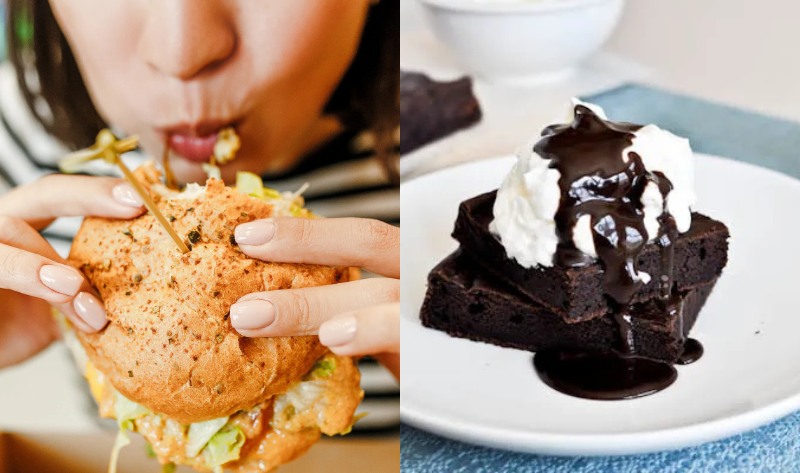
Are you eating just in case you get hungry later on? And do you spend a lot of time holding the refrigerator door open looking for what to eat next? Are you a self-confessed foodie? People eat food for various reasons, first and most importantly, to survive and thrive. Food provides energy and nutrients to support life, but nowadays, our busy lifestyles lead us to consume more food and calories than our bodies actually need! With the easy availability of processed food, convenience of ordering food from delivery apps, and the never-ending supply of cheap snacks, we are eating in the absence of genuine hunger, sometimes to kill boredom, to fight stress stress, or to socially bond with friends and peers. This confusion between real hunger and emotional or environmental triggers can contribute to overeating and weight gain. Developing mindfulness about our body’s signals and practicing mindful eating can help us make better food choices and help us lose weight if we are trying to get lean and healthy. So, here are 8 questions to ask yourself before every meal for weight loss.
1. Am I Really Hungry?
Are you eating just because you are bored and there’s nothing better to do? Are you feeling anxious and stressed out and a tub of ice cream would instantly make you feel better? Before you pick anything to eat, make sure it’s a real need to replenish energy, and you are not giving into emotional eating to tackle stress, boredom, or tide over other emotions. This kind of meal may add unnecessary calories that will act as roadblock in your weight loss journey.
2. Are you Eating To Give Company To Others?
Social gatherings, work meetings, and other events often revolve around food where we indulge just to give company. Politely say “no” if you aren’t hungry or if the food does not fit into your diet routine. Remember that social gatherings are about connecting with others and should not just revolve around food. If you do choose to eat, opt for healthier options like salads, soups or steamed vegetables. Avoid fried and calorie-dense foods.
3. Are There Any Distractions Around?
When you eat without distractions, such as watching TV, scrolling through your phone, you can practice mindful eating and be aware about the food you are consuming. You would also be able to identify the body’s hunger and fullness cues, and avoid overeating, which can all help with weight loss.
4. Is This Food in My Diet Plan?
If you are following a weight loss plan, make sure you are not adding any extra calories by eating food outside of your diet routine. It’s important to maintain a calorie deficit to lose weight and if the meal before you would add too many extra calories, it’s better to avoid it. Also read: “8 Surprising Sources of Empty Calories you May Be Overlooking.”
5. Did I Practice Portion Control?
Practicing portion control is essential to maintain a calorie deficit, where you are eating fewer calories and burning more to get the body to use stored fat for energy. Without portion control, keeping track of calories is difficult. So make sure you have measured out the food and it’s not an extra serving of a big meal.
6. Would This Food Nourish My Body?
Do you know we need so many nutrients even to burn fat? Especially protein, fiber, healthy fats, iron, zinc, copper, calcium, and many other such nutrients. If you are eating food with empty calories or something that’s high in sugar and fat, in the absence of nutrients, the body would soon send out hunger signals all over again to meet its nutrient requirement. Also, fiber and protein can help you feel fuller for longer periods. So, do make sure you are eating a nutrient-rich meal and not just empty calories.
7. Am I Giving Into Cravings?
Cravings for specific foods and indulging in favorite snacks can lead to frequent eating episodes. Cravings, whether for sweet, salty, or savory foods, can lead to weight gain. If you are just craving for something and not really hungry, say “no” to yourself. Also read: “7 Ways To Prevent Overeating While Snacking.”
8. How Would I Feel After Eating This Food?
If you are going to immediate regret after having the food, then it’s not for you. Focus on how you would feel after eating – healthy, portion-controlled food would make you feel good. On the other hand, junk and heavy food can make you feel sluggish and uncomfortable. Sugar-rich foods will leave you hungry soon after with the sharp rise and subsequent dip in blood sugar. If the meal is part of your cheat meal, then that’s completely fine because they prevent the feelings of restriction, satisfy cravings, and help individuals to adhere to their diet plan better.
Summing up, when starting out on your weight loss journey, you would need to be totally aware of every meal that you are having. Just ask these basic questions and stick to the diet plan to successfully lose weight. Also, to lose weight fast without compromising on nutrition or health, subscribe to the Rati Beauty app to access all our diet plans.
7 Ways To Prevent Overeating While Snacking
8 Surprising Sources of Empty Calories you May Be Overlooking
The post 8 Questions to Ask Yourself Before Every Meal For Weight Loss appeared first on Makeupandbeauty.com.
